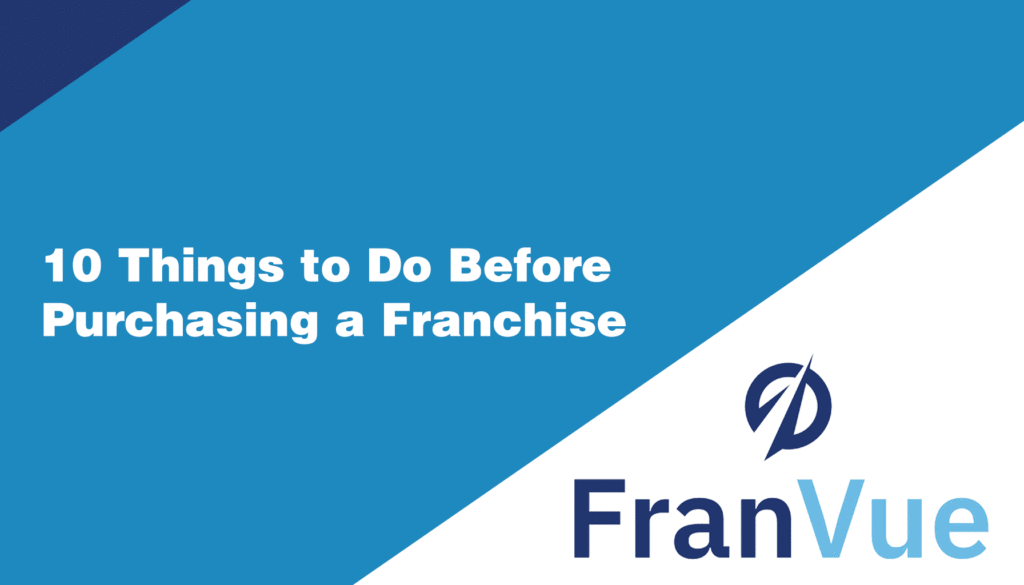Purchasing a franchise is a big decision that can affect your life in a lot of ways. So, it’s crucial that you think through the decision and extensively research the franchise you are interested in before investing. Here are 10 things you need to tick off your list when considering buying a franchise.
1. Carry out Your Research
You should not take part in any business transaction unless you have done thorough research about the opportunity, and this is especially important when buying a franchise. The FDD (franchise disclosure document) contains a lot of information about the franchise company, its franchisees, and its revenues. Make sure to read it carefully.
2. Learn About the Franchise Team
As a prospective franchisee, it’s also important that you know everything about the folks you will be working with for a long time. Find out their business experience, how long each person has been with the franchise company, and other information about the top executives of the parent company.
3. Find out How Much You Will Need to Invest
The initial franchise fee does not provide a full picture of what it would actually cost to set up, open, and then maintain a franchise.
Aside from the upfront franchise fee that you will pay to the franchisor, you will have to pay royalty fees. These payments are made on a regular basis and are usually a percentage of the franchisee’s monthly sales. Determine what these royalty fees cover and whether you will need to make other payments, like a separate marketing fee.
4. Create Your Budget
When you know all the franchisor’s fees and costs, you can include the following expenses to create a budget.
- Inventory
- Real estate
- Building remodeling
- Utilities
- Payroll
- Your own salary
Since there’s no assurance that you will make profits in the first few months of beginning your franchise (in fact, you should aim to break even), make your budget for the first operational year, and makes sure to add all expenses, including your own salary. You don’t want a situation where you have invested so much in the business that you are now broke, making you close down or sell the franchise.
5. Determine Your Net Worth
Your net worth is one of the things that the franchisor will consider to determine whether or not you are fit to become a franchisee. Net worth is how much money you will have left once you minus your liabilities from your assets. It shows the franchisor how good you are at managing money and how good you may be at helping the franchisor grow its brand. A high net worth tells the franchisor company that you are careful about business opportunities you choose, and this will make them want you the more.
6. Register Your Franchise as an LLC or a Corporation
Creating a limited liability company (LLC) or incorporating your franchise is one of the best decisions you can make as a new franchisee. This is because both business models offer protection to entrepreneurs. For example, if the individual assets can be liquidated if the franchise is sued or garnered debts. Each business model also offers some kind of tax advantages. As a matter of fact, many franchisors include forming an LLC as part of the conditions in their franchise agreement.
7. Get a Separate Bank Account for Your Franchise
Using the same account for your personal finances and those of your franchise can make accounting and tax preparation tasks difficult. Therefore, one of the first steps to take when launching a franchise is getting a separate bank account for the business and probably a business checking account, too.
To create a business bank account, you will need to provide an employer identification number (EIN) and evidence that you have created an LLC or incorporated your franchise. So, you should wait until your business structure application is approved before going doing this.
8. Figure out Your Financing Options
Like many prospective franchisees, you may not have the money to manage a new business, and even if you do, it’s still good to obtain a loan to save cash. Based on your credit profile, you are going to have many financing options you can explore, such as franchisor in-housing funding, an SBA loan, or a line of credit from your bank.
9. Select Your Industry and Franchise Wisely
Choosing the industry to venture into is one of the biggest decisions you will need to make when selecting a franchise to invest in. It would be best to choose an industry that you have experience in and/or have a great passion for. Selecting a franchise industry just because you think it will fetch money really quick hardly goes well. It is better to enter a field you are knowledgeable about.
Review various franchise opportunities you find and weigh your options. Why is one franchise brand (or location) more successful than the other? It’s important to know what makes a particular franchise successful.
10. Speak with Other Franchise Owners
One important part of the Franchise Disclosure Document is the section containing the names, phone numbers, and addresses of former and present franchisees of the business. Use this information to reach out to multiple franchisees to know what their experience working with the parent company is like.


